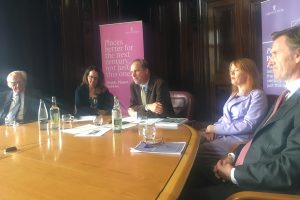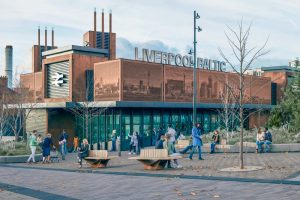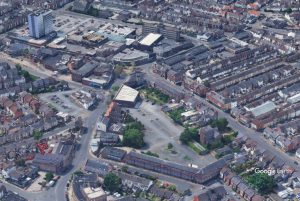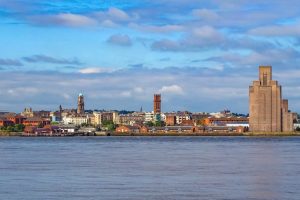Power to the people, says Liverpool’s favourite Tory

Liverpool’s future lies with devolved powers, and current Metro Mayor, Steve Rotheram, has been urged to press on with his manifesto to ensure the best opportunities for regeneration.
That is the belief of Lord Michael Heseltine, 90, former Tory Deputy Prime Minister and Minister for Merseyside, and the man widely acknowledged as the kick-start for the city’s renaissance in the early 1980s.
Following the 1981 summer riots in Toxteth the city was a basket case, but Lord Heseltine, in his capacity as Minister for Merseyside, implored Prime Minister Margaret Thatcher – no friend of Liverpool – to let him “walk the streets”, talking and listening to the local communities.
She agreed and he devised a 30-point plan as a basis for recovery, starting with reversing proposals to demolish the then derelict Albert Dock, now the Royal Albert Dock and a prime tourism draw for the city.
Another was his pioneering work to clean up the polluted River Mersey, for so long the lifeblood of the city once dubbed the Second City of the Empire for its international trade.
Lord Heseltine was in Liverpool yesterday (September 6) to mark the 15th anniversary of the £1bn Liverpool One retail centre, itself a symbol of regeneration, and to discuss the city’s progress over the past 40-odd years.
He is a huge supporter of devolving power from central government to the regions and he believes Steve Rotheram is a leader who can continue the region’s recovery.
When asked by TheBusinessDesk.com what he would urge Mayor Rotheram to focus on, he said: “The economic strength of Merseyside – which I think he is.
“I’m delighted that he’s renewed Clean the Mersey, because clean water is going to be one of the great issues of this century and Liverpool, it can be argued, is ahead of the game because of the Clean the Mersey campaign of 1979.
“It brings docks, it brings entertainment opportunities, leisure opportunities, sporting opportunities, and it brings all the culture and investment opportunities that flow from clean water.
“But don’t misunderstand me. I’m not saying that should be his priority.
“His job is to deliver the success of Merseyside and that requires vision, energy, enterprise and a partnership with the government of the day.”
Lord Heseltine was on a panel at the Royal Liver Building board room, along with Claire McColgan, director of culture at Liverpool City Council, Mark Preston, executive trustee and chief executive of property giant Grosvenor, which developed Liverpool One, and Zoe Davidson, partner at Deloitte.

From left: Lord Heseltine, Zoe Davidson, moderator Nicholas Boys-Smith, Clare McColgan, Mark Preston
The Tory Grandee produced a report, It Took A Riot, following the week-long unrest on the streets of Toxteth, which was the template to begin restoration of the city’s pride and belief, and once again, give it a future.
Following the riots he recounted: “I said to Margaret, of course we must back the police, but I’m edgy, I don’t think it’s as quite as simple as that.
“Will you let me walk the streets? I spent three weeks finding opportunities. Walking the streets, talking, listening. Everyone knew what was wrong, but it was ‘never me’.”
He admitted his first inspiration came from looking out of his hotel room at the River Mersey. He said: “It brought tears to my eyes. What have we done to you? The great lifeblood of the city – it was an open sewer. Now it’s a world leading example.”
He said he and his team “became immersed in the enormity and the tragedy of this great city”.
But he remembers on so many occasions early on encountering myriad obstacles and negativity.
Years later, Tory Prime Minister David Cameron tasked Lord Heseltine with returning to the city, along with Liverpool-born Sir Terry Leahy, former Tesco chief executive, to work on a “re-run” of his It Took A Riot report.
He said the difference in attitude and confidence was there to see: “They all came in and said, ‘this is what should happen, this is what should be done’, and they all believed in it.”
By way of illustration, he quotes a statistic: “In 1979 there were 1,000 beds in hotels, today, there are 9,000 beds in hotels. That graph is only going to go one way. As an entertainment city, this has got huge potential.”
Lord Heseltine had helped arrest the decline and provided a re-set for the city’s fortunes. But another major event applied a booster to that recovery.
Clare McColgan was part of the successful bid team that won Liverpool the title of European Capital of Culture 2008. The team was led by Sir Bob Scott, a prominent figure in Manchester who had helped revive the city’s two main theatres, the Palace, in 1981 and the Opera House in 1984.
But Ms McColgan said there were doubts: “Bob Scott said the city had lost its confidence.”
She said it had been devastated by the 1989 Hillsborough tragedy, when 96 Liverpool fans lost their lives at an FA Cup semi-final, while the city also had to contend with “a national press which had a very linear view of Liverpool”.
An infamous Sunday Times article had dubbed Liverpool, ‘Self-Pity City’.
Ms McColgan said: “What Capital of Culture did was make the city’s head rise, and its shoulders rise.
“On the opening night of Capital of Culture when Ringo Starr was on St George’s plateau, the city’s shoulders rose.”
Mark Preston also cited the ‘can’t do’ attitude in the city in the late 90s when Grosvenor responded to a Liverpool City Council call for expressions of interest in developing more than 40 acres of derelict city centre buildings and bombsites.
He said: “There was a can’t do attitude – people saying, ‘this won’t happen here’.
“When we started construction in 2004 and we had broken ground, there were still people saying, ‘it will never happen here’.”
He admitted: “We were taking a very big bet. But thanks to the work Lord Heseltine had done, and the work of the council, this would happen. We realised then that here was a city that had been under-developed for so long.”
He revealed that, privately, the council was worried it would receive no expressions of interest to redevelop the land – but 47 developers responded.
Discussing the current direction of 2023 Britain, both Mr Preston and Lord Heseltine expressed their frustrations with the conditions to generate successful businesses, and regions.
Mr Preston said: “Business hates uncertainty and inconsistency, and in the past two years we have had lots of those two things.
“What is lacking is proper long term thinking – right across the board, from leadership and across the parties.”
Lord Hesltine responded, saying: “Your analysis is serious and depressing – but it’s too optimistic.
“There is no strategy. There’s not even an agreement to have a strategy.”
However, his closing comments on the prospects for Liverpool were considerably more upbeat: “Just keep it going – it’s unstoppable.”








